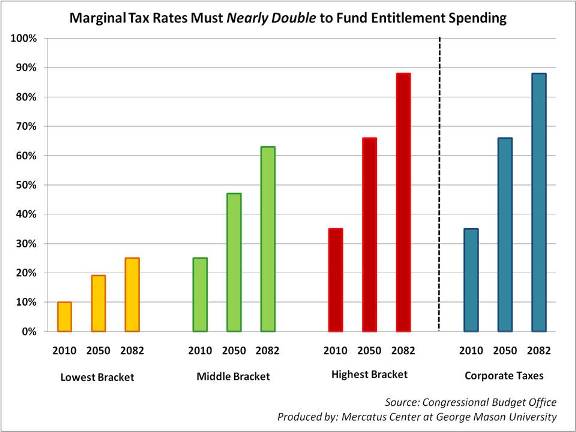Here is a sobering chart from the Mercatus Center at George Mason University. Mercatus Center Senior Research Fellow and Reason magazine contributor Veronique de Rugy (see an archive of her Reason articles here) used Congressional Budget Office data to calculate the hike in federal income tax rates that will be required to maintain the increasingly costly Social Security, Medicare, and Medicaid entitlement programs at current benefit levels.
Even for the lowest tax bracket, annual federal income taxes will have to more than double to pay for current levels of Medicare, Medicaid and Social Security spending. These massive tax increases will be necessary in spite of the recently legislated changes to the healthcare system, which CBO has determined will increase costs over the next 20 years and will have indeterminate budget effects into the future.
In 2010, Medicare and Medicaid will cost a projected 5.0 percent of GDP and Social Security will cost a projected 4.8 percent of GDP. Combined, that is just under 10 percent of GDP. By 2020, the combined cost of these three programs is already projected to grow to 11.4 percent of GDP; extrapolating forward at constant growth rates, their cost will be at about 14.4 percent of GDP by 2030. To put this in context, total federal spending has averaged 18.5% of GDP over the last 40 years.
While things like “bridge to nowhere” earmarks grab a lot of the headlines—and, indeed, these are maddening abuses of taxpayer dollars—they represent only a minuscule portion of the federal budget. To truly make any headway in cutting the size and scope of the federal government down to a more reasonable, fiscally manageable, and individual freedom-friendly level, there must be serious reform of the entitlement programs, which make up the bulk of the budget (especially if you take out defense spending). Clearly, we are on an unsustainable trajectory and it is time to start asking fundamental questions like why government intrusions into the health care industry have led to higher costs, fewer choices for consumers, and oftentimes poorer quality of care; whether retirement planning should really be under government purview; or why individuals cannot at least opt out of the Social Security system and handle their own retirement investments and plans.
